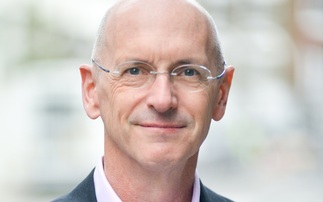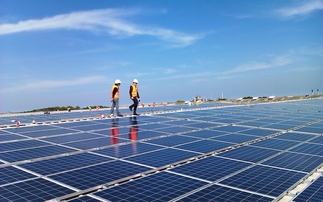It's been a tumultuous year for the green economy - but beyond the depressing headlines there has been much to celebrate
We were kidding ourselves. It was never going to be that simple. It was never all going to be OK.
Previous great economic transitions may have delivered epic levels of progress and prosperity, but they have always been difficult and messy and marred by setbacks. The repercussions from the abolition of slavery almost 200 years ago and the failure of the UK, US, and others to address historic injustices continue to echo through the ages. The last 12 months are just the latest in a long line of reminders that globalisation and the transition to a digital, knowledge-based economy is not exactly panning out as hoped.
In addition to showing how globalisation will not flow smoothly in one direction, 2016 has also provided a reminder that decarbonisation will be similarly complicated. There will be setbacks; big and potentially catastrophic setbacks.
Trump and others will try to tilt markets back in favour of polluting fossil fuels even if it costs more, both financially and environmentally, to do so - justifying their logic defying actions with a culture war that Atwood's Church of PetrOleum would recognise. Armed with fresh evidence of how effectively fake news and a partisan agenda can work media moguls will step up efforts to present a small minority of anti-environmental thinking as the dominant mainstream. There are credible reasons to fear that unless managed very carefully, the internet of things could prove itself to be both an essential component of a decarbonised economy, and an atomising, job-destroying, Statsi-friendly tool of mass surveillance and mass unemployment beloved of dictators everywhere.
Most disturbingly of all, 2016 has hammered home how the Petrostate economies, staring down the barrel of inevitable decline, could use their remaining energy reserves and revenues to protect, project, and retain their power in the most brutal of ways. Just as nowhere near enough effort has gone into understanding how climate impacts are shaping mass migration patterns, nowhere near enough attention is being paid to how Russia's digital and military adventurism and the flexing of muscles by many of the Gulf autocracies in a series of proxy wars has been revived at a time when the long term future of their fossil fuelled economies has never looked more threatened.
Consequently, just like this year, 2017 will see immense and inspiring progress by green businesses and economies, but it will also see a more aggressive kickback from regressive forces than at any point in living memory. It will be, to slightly misquote another great novel, "the best of times, the worst of times, the age of wisdom, the age of foolishness, the epoch of belief, the epoch of incredulity".
The challenge for environmentalists and green businesses is that the scale of the environmental risks we face does not leave much space for too many more years of equivocal progress. We need deep cuts in emissions, not a stalling in emissions growth. We need a drastic decline in fossil fuel investment, not simply a growing realisation of carbon bubble fears, welcome as that is. We need the shared endeavour embodied in the Paris Agreement, unsullied by the narrow nationalism embodied in Trumpism and Putinism.
The late great journalist and broadcaster Simon Hoggart would often remark on the misues of the phrase 'a curate's egg' to describe an event that is part good and part bad. He would remark that any egg that is part bad is a wholly bad egg. 2016 has been a curate's egg of a year in the true sense. Parts have been good and parts bad, but the scale of the green economic transition we have to deliver means there is no space left for us to stomach the pollution from the bad parts.
As the year draws to a close it appears that we are at the beginning of the end of something. With Trump and his acolytes plotting a period of sustained ascendancy, and terrorism and nationalism stalking the world's oldest democracies, we could conceiveably be at the beginning of the end of an era of liberal enlightenment. Equally, with clean technologies and environmental thinking more firmly entrenched in the mainstream than ever before we could be at the beginning of the end of the pollution age. Curiously, we may be at the beginning of the end of both epochs.
The only way to tilt the narrative further in the direction of progress and environmental health is by continuing to fight for all the things the green economy stands for, to recognise that, despite the threats posed by Trumpism and economic nationalism, environmental advocates are winning far more battles than they lose. As Atwood rightly envisaged, those solar technologies and their clean tech cousins will definitely win out in the end, and if we work hard enough we might just harness them in time to head off the risk of a polluted dystopia.
To do so we must continue to call out misinformation, flawed arguments, and hypocrises of pollution-favouring politicians and businesses whereever we see them, because if 2016 has taught us one thing it is that self-serving and at times repugnant arguments from the extremes of the political and business spectrum cannot simply be ignored in the hope that they will go away.
So you can be a pro-business President or you can be a President who opposes the clean technologies and sustainable business models of the 21st century, but you can't be both. You can accept climate change is happening while arguing it may not be that serious, or you can oppose ambitious action to cut emissions, but basic principles of risk management mean you can't be both. You can accept the world is committed to delivering a net zero emission economy and less than 2C of warming this century or you can continue to invest in high carbon infrastructure, but you can't do both.
But most of all we must continue to make it clear that the only long term development path available for the industrialised and developing world alike is one that is sustainable in the truest sense of the word. The world's myriad challenges, from climate change through biodiversity loss, geopolitical insecurity, poverty and inequality, and political extremism can only be tackled with an economic system that is clean, low carbon, and respectful of the environment.
Beyond the depressing headlines, there has been more than enough green business progress during 2016 to keep the dream of a healthy, prosperous, and sustainable global economy alive. In 2017 the task before green business leaders and environmentalists everywhere is to ensure that in the face of challenging headwinds, this most important of narratives commands the respect and prominence it deserves.









